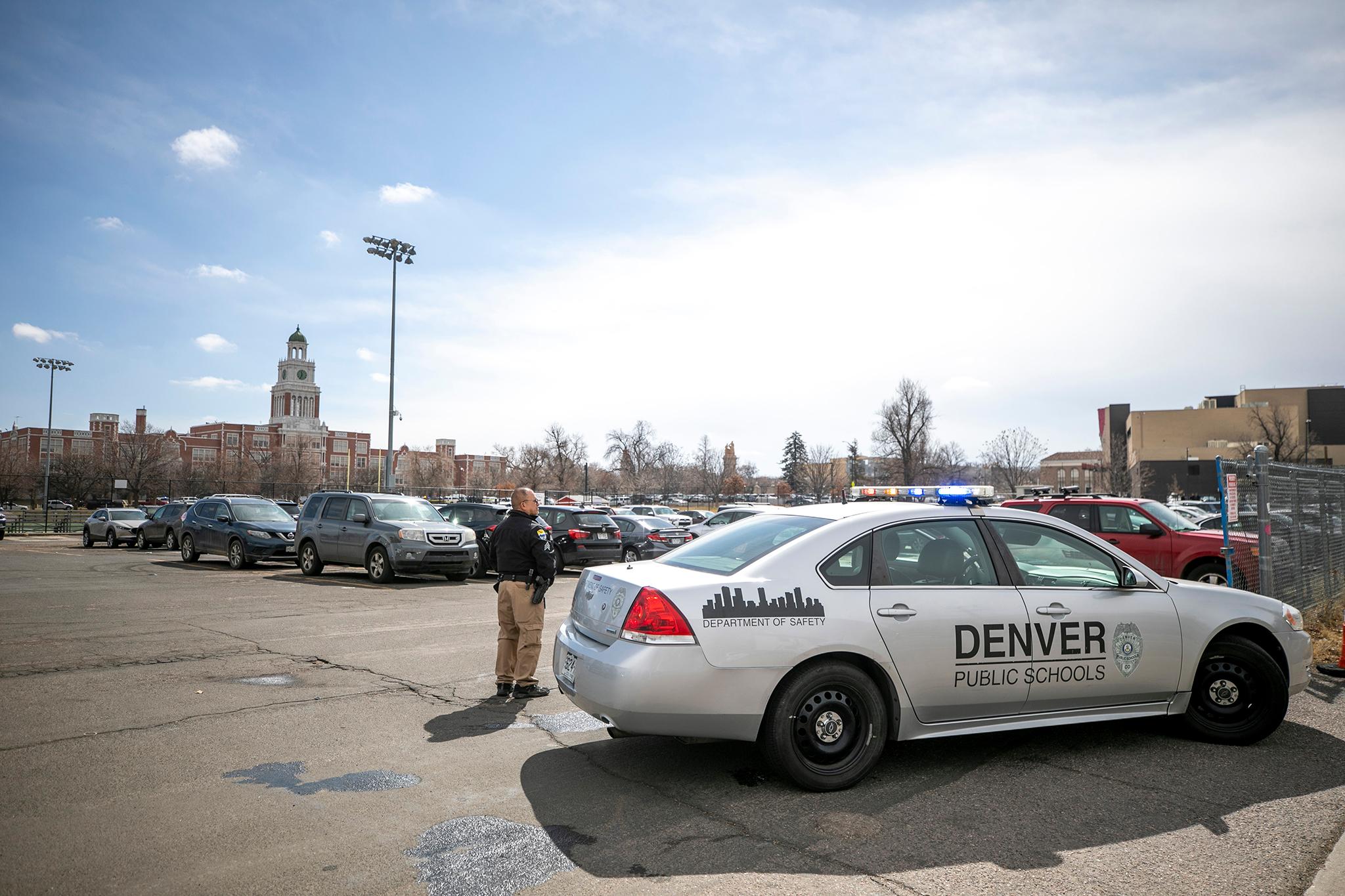The daily searches of an East High School student who shot two administrators inside the school this week were prompted by a report, just last week, that he had been spotted with a gun.
But because authorities couldn't prove that he brought the gun to school, and because his father declined to allow a search of their home, the student was allowed to continue going to classes as long as he submitted to a daily pat down by administrators to ensure he didn't have a firearm.
For several days, the searches were inconsequential and drama-free. But on Wednesday, two administrators found a gun and the student, 17-year-old Austin Lyle, opened fire before running. The administrators were wounded by gunfire, but both are expected to recover.
It was the latest confounding incident for family members, law enforcement and school officials on what to do about Lyle, a bright, 17-year-old and passionate advocate for the Second Amendment right to bear arms who felt he had the right to possess firearms -- perhaps even on a high school campus. And law enforcement sources say that attitude, at least partly, led him on a tortured 16-month path from a promising future as a potential engineering major to the woods outside of Bailey where he took his own life earlier this week.
This account is pieced together from law enforcement sources and educators who agreed to speak to CPR News on the condition of anonymity to freely discuss juvenile matters that are otherwise not public.
A Safe2Tell tip leads to a weapons charge and expulsion
Lyle's legal trouble with guns started with a 2021 tip to the Safe2Tell hotline forwarded to Overland High School in the Cherry Creek School District. It said he had posted a Snapchat image of himself holding a gun surrounded by what was described as a large amount of ammunition.
Overland High School leaders called the Aurora Police Department on Nov. 23, 2021, and they spoke with Lyle in a conference room. After he took what they described as an aggressive posture with them, they placed him in handcuffs.
Lyle, a discus thrower and shot-putter on the track and field team despite his slight build, told officers that it wasn't illegal to have guns and that he was a gun collector. At the same time, he said the gun in the photo wasn't his, and he refused to allow officers to search him, though he acknowledged having marijuana in his backpack.
The police removed the handcuffs and spent more time with him, but then, without any evidence to warrant a further search or charge Lyle with a crime, they left. Meanwhile, school officials contacted his mother and asked her to check her son's bedroom. She agreed, and then called Aurora Police to tell them she found a weapon. When officers arrived at her house, she gave them permission to search and they found a black and gray AR-15-style rifle, capped by a silencer, along with a 30-round ammunition magazine in Lyle's bedroom.
A law enforcement source who spoke to CPR News called it a so-called ghost gun, an untraceable weapon usually purchased in kits that people can put together at home. It is unknown where Lyle got the gun or if he assembled it himself.
The magazine violated Colorado's size restriction, and while silencers require a special federal tax stamp, this one didn't have that.
In Arapahoe County, Lyle was charged in juvenile court with possession of a dangerous or illegal weapon and possession of a large-capacity magazine. He qualified for a diversion program, which included requirements that he wouldn't further break the law, and could lead to dismissal of the charges if he complied with all the requirements.
He would eventually be expelled from the Cherry Creek School District, but by then he was in Florida, where he moved with his mother.
The student then failed in his diversion program, for reasons that are not entirely clear. He chose to plead guilty to a misdemeanor count from the earlier charges and was placed on juvenile probation.
A move to Denver and East High
Then, in January of this year, his probation was transferred to Denver County when he moved back to Colorado to live with his father in an apartment in the Congress Park neighborhood. He enrolled at East High School where administrators were made aware of his troubled past, but did not circulate his history widely among staff.
Denver district officials did not immediately answer questions on Friday about how the decision was made to enroll him at East, versus some other program more tailored to students with criminal backgrounds. Students and staff district-wide were off Friday as a mental health day in light of the week's events, and the district is on spring break next week.
Lyle's status as a probationer meant he could be subjected to searches by law enforcement or probation officers at any time to monitor his compliance with the conditions of his probation. But DPS and the Denver Police Department said even if school resource officers were on campus, they would not have conducted searches of a student. That's why the task fell to educators.
Still, Lyle's semester was largely uneventful. He was described as making good grades and progressing on probation.
Until last week.
The shooting
That's when a fellow student reported that Lyle may have had a gun. A campus security officer sought to question him, but he left the school instead. Denver police then went to his father's apartment and asked to search the student's bedroom. His father refused.
Without evidence beyond the tip, East High officials agreed to let him come back to school, but only under the condition he would be searched before he was allowed into the building as a part of a DPS "school safety plan." Again, the plan's details were confined to a handful of administrators while others on campus, including at least some of his teachers, were not told.
DPS Superintendent Alex Marrero said there were school safety plans in "every" school across the district, but a former principal at East High School, John Youngquist, said only one or two students -- out of more than 2,500 -- were ever on them at one time when he was in charge at East. He added that they're not common.
On Thursday, however, Marrero said the regular administrator who normally patted Lyle down before he entered the school was not available. That left the task to Jerald Mason and Eric Sinclair, administrators at the school who Lyle shot in rapid succession before taking off with the gun in his red Volvo sports utility vehicle.
"Perhaps that prompted it," Marrero told reporters, about possible reasons Lyle shot at administrators. "It's hard to speculate. But that's what we've learned."
A manhunt lasted all day before Lyle was eventually found dead west of Denver, in Park County, near his car with a self-inflicted gunshot wound.
The gun they found with him in the woods was also a ghost gun, a law enforcement source said.
What happens next for security in schools
The incident resulted in anger among parents and educators, and soul-searching among administrators and DPS officials.
In 2020, the DPS Board of Education had voted to remove Denver Police school resource officers from all campuses by the end of the 2020-21 school year, and Wednesday's shootings prompted an immediate, if temporary, about-face to invite officers back on campus for at least the remainder of this year.
It is now the most recent and glaring indicator that replacing police officers on campus can be far more complicated than it seems.
After the 2020 vote, Denver city officials created an agreement with the DPS Department of Safety to allow the district's safety patrol officers to write tickets and run warrants and conduct other duties that are very similar to those of a licensed peace officer in Colorado.
The trouble is, according to state officials, they are not all licensed peace officers, and the DPS Department of Public Safety is not a law enforcement agency.
State officials threatened to sue DPS in 2022 after an investigation into how the security guards were operating on campuses, according to an agreement reached between the Peace Officer Standards and Training board and DPS.
Investigators found that the district's safety patrol officers openly carried firearms, operated vehicles with red and blue lights and sirens, responded to "emergent" calls including student fights and reports of students with weapons, and ran checks of warrants and criminal histories of people -- without authorization.
In the agreement reached by state officials, DPS admitted to no wrongdoing, but agreed to halt activities preserved for law enforcement officers in Colorado to avoid protracted litigation.
That meant, according to calls for service at East High School, they just dialed up the Denver Police Department more often.
Denver Police were called to East an average of once a day to help with things as minor as kids who left car doors open in the student parking lot as well as to assist students and administrators file mandatory sex assault reports of events that occurred off campus on weekends.
The school or the grounds just beyond it have been the scene of three shooting incidents in a matter of months.












